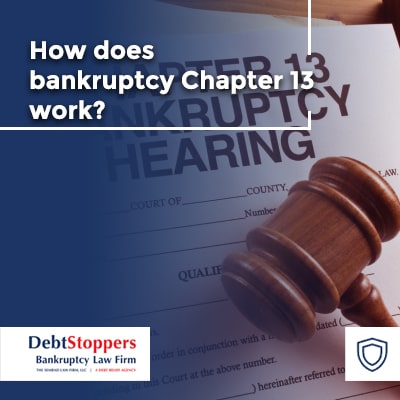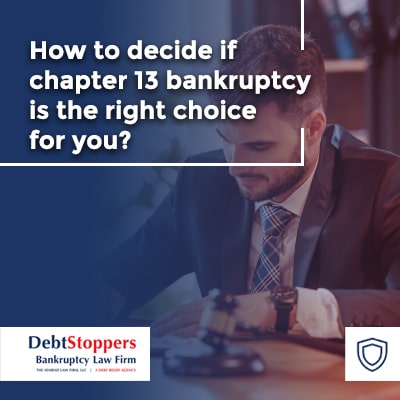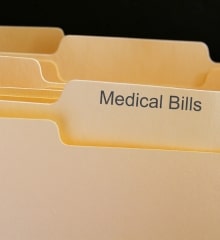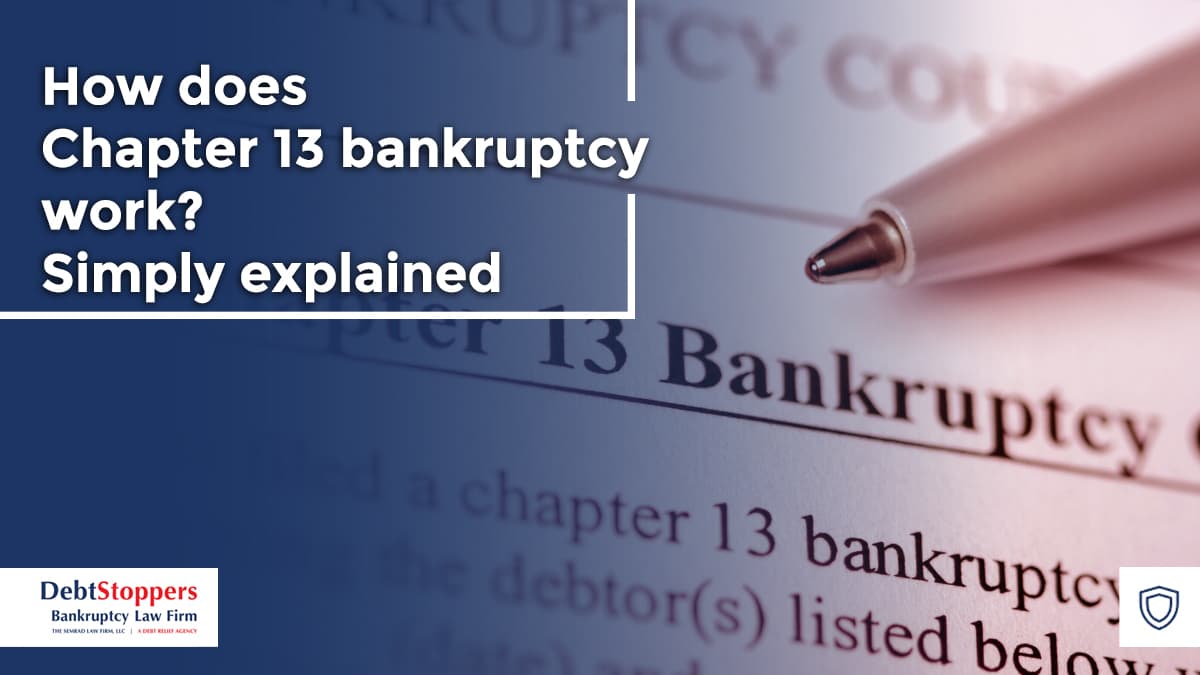Chapter 13 bankruptcy is a valuable tool for people with a steady income who need time to catch up on overdue payments. Chapter 13 is a complex legal process but this guide will explain what you need to know about how Chapter 13 bankruptcy works.
Unlike Chapter 7 bankruptcy, which involves liquidating assets, Chapter 13 enables you to keep your property while making payments to creditors based on what you can afford.

How does bankruptcy Chapter 13 work?
Chapter 13 is sometimes called reorganization bankruptcy because it allows people to restructure or reorganize their debts. Chapter 13 bankruptcy allows you to keep your possessions while making affordable monthly payments based on your income during a repayment period of three to five years.
Chapter 13 can be a powerful tool to help people to gain control of their financial future and make their lives more affordable again.
Income requirement
You must have a consistent and reliable source of money to make monthly payments under the repayment plan. However, the monthly payments are based on what you can afford.
For example, you can qualify for a three-year repayment plan if your income is below the median for your state. If your income is above the median for your state, the repayment period is generally five years.
Debt limits
As of 2024, to qualify for Chapter 13 bankruptcy, your unsecured debts (e.g., credit cards and medical bills) must be less than $465,275, and your secured debts (e.g., mortgages and car loans) must be less than $1,395,875.
If your debt exceeds these limits, you may need to consider Chapter 11 bankruptcy, which provides many of the same benefits but has no debt limits.
Filing for chapter 13 bankruptcy
Filing for Chapter 13 bankruptcy is a complex process that requires several steps.
Before filing for Chapter 13, you must complete a credit counseling course from an approved agency. You will be required to submit the certificate of completion when you file your bankruptcy petition.
Next, you (or your attorney) will file a bankruptcy petition with the court, which includes detailed paperwork about your financial situation and a proposed repayment plan.
As soon as you file your petition with the court, an automatic stay goes into effect, which stops creditors from collecting on debts, initiating foreclosures, repossessions, wage garnishments, or lawsuits.
About a month after filing, you will attend the 341 meeting, where the bankruptcy trustee and any creditors can ask you questions about your financial situation and the proposed repayment plan. After the 341 Meeting, the court holds a hearing to review your repayment plan and allow creditors to object to the plan if they believe it is not feasible or fair.
If the court approves the plan, you will begin making regular payments to the trustee, who then distributes the funds to creditors according to the terms of the plan. These payments may be deducted directly from your wages or made through other arrangements.
Once you successfully complete all payments under the repayment plan, the court will issue a discharge order, eliminating your responsibility for any remaining eligible unsecured debts.
Benefits of Chapter 13 Bankruptcy
There are numerous benefits of Chapter 13 bankruptcy. Ultimately, Chapter 13 can make your life affordable again and give you an opportunity for a fresh financial start.
Some of the biggest benefits of filing Chapter 13 bankruptcy are avoiding foreclosure, keeping your property, and restructuring your debt to make payments you can actually afford.
Avoid foreclosure
Chapter 13 can halt foreclosure or repossession, giving you time to catch up on missed payments. If you are in danger of foreclosure, Chapter 13 can stop the foreclosure and give you more time.
Keep your property
Chapter 13 allows you to keep your assets, including your home and car. Unlike Chapter 7, you are not required to liquidate your assets to pay your debt.
Debt restructuring
Chapter 13 allows you to restructure your debt and make affordable monthly payments for a fixed period; after that, all other eligible debt is discharged.

How to decide if chapter 13 bankruptcy is the right choice for you?
To decide if Chapter 13 bankruptcy is the right choice for you, it is wise to consult an experienced bankruptcy attorney. An attorney can help you evaluate your unique personal situation.
Understanding the type and amount of your debt is critical when deciding on Chapter 13 bankruptcy. An experienced bankruptcy attorney can help you assess your debt and overall financial situation.
If you’re behind on secured debts and want to avoid foreclosure or repossession, Chapter 13 may be a good choice since it allows you to catch up on overdue payments through a repayment plan.
However, it’s important to note that Chapter 13 requires a commitment to a three to five-year repayment plan, which requires disciplined budgeting and financial management. You’ll be required to follow a structured repayment plan and any changes in your financial situation could affect your ability to complete the plan.
If you have a significant amount of unsecured debt, Chapter 13 enables you to pay a portion of these debts based on your ability to pay, and any remaining eligible unsecured debt is discharged after completing the plan.
An experienced bankruptcy attorney can evaluate if you qualify for Chapter 13 and will make sure you can take advantage of all exemptions allowable under the law.





